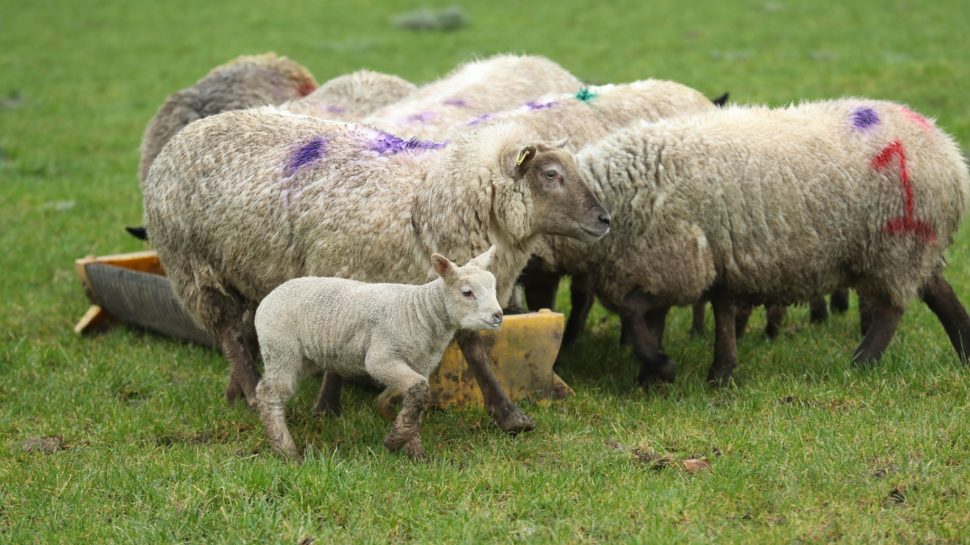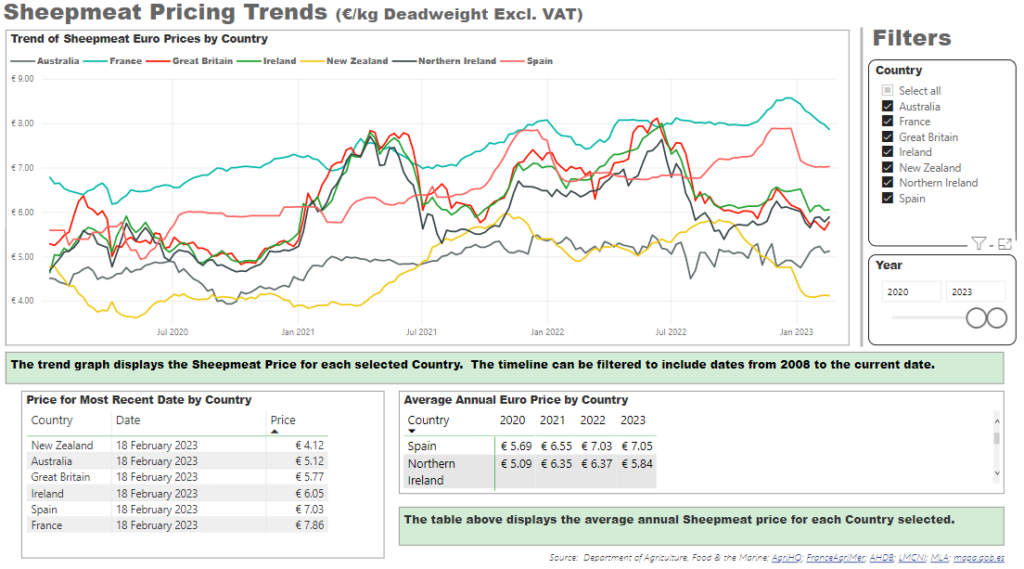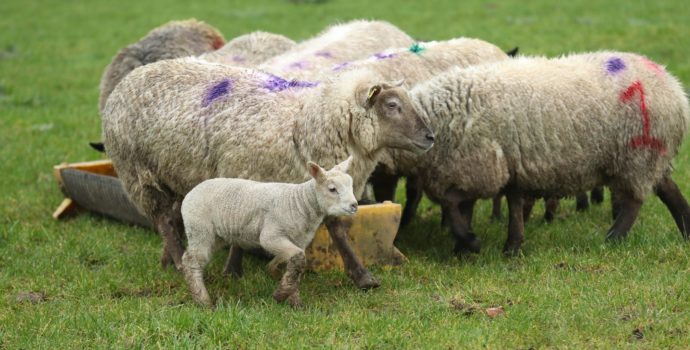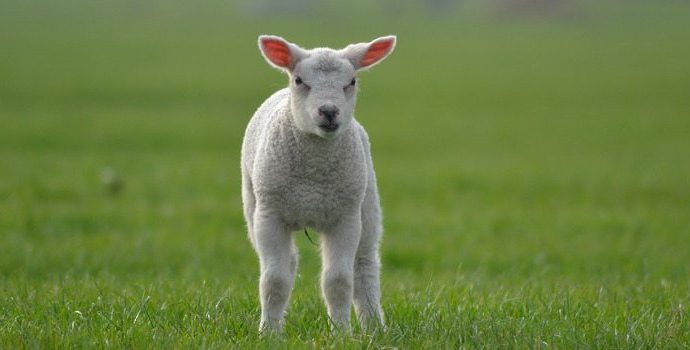Sheep Reports
Sheep Council Report March 2023

- Market Report
- Lamb Price: lambs are making €6.00 to €6.35kg on weights to 23/kg. Cull Ewe prices are ranging from €3.00 to €3.40kg in general.

- Supplies: Total throughput to date in 2023 is 367,678 head which represents a 2% increase when compared to the same period in 2022. Lamb/hogget throughput is running 4,327 head or 1% ahead of the same period in 2022.

- Market Conditions; Lamb prices have come under pressure in recent weeks. Inflation pressures are impacting demand for lamb in key export markets and also on the domestic market, with weaker demand in particular for larger and more valuable cuts. During 2022 EU sheep meat imports from UK and New Zealand rose by 10% and 27% respectively. Overall imports to the EU increased by 31% while EU sheep meat exports declined 5% in the same period. Increased competition from UK and Southern Hemisphere countries continues too impact prices in Ireland. Forecasted recovery in the Chinese market would help to redirect NZ product and relieve EU markets in 2023.
- A decline in sheep meat production is projected for 2023 due to a smaller ewe flock and lighter carcass weights. Consumption is also expected to fall by 1.8% due to inflation and higher costs of living.
- In 2022 exports to over 35 countries were valued at €476m an increase of 17% with over 75,000t of sheep meat exported representing a 10% increase on 2021 levels.
- Continued engagement with MII and sheep factory management.
- Increased QA Bonus: IFA continue to pursue an increase in the QA bonus to 30c/kg and have had discussions with Bord Bia, MII and factory representatives on the issue.
- Farmers are encouraged to sell hard while moving lambs as they become fit.
- IFA publish lamb price updates twice weekly and all of the latest data is available at www.ifa.ie
- Activity since last National Council
- Attended the first meeting of the wool council in December.
- Met DAFM officials on November 28th and January 25th to discuss the Sheep improvement scheme and Early-stage support for Producer Organisations terms and conditions.
- Met with Connacht marts on January 17th.
- Hosted a National Sheep meeting in Athlone on January 23rd and in Tuam on February 8th to discuss the sheep sector income crises.
- An emergency Sheep committee meeting convened on 10th February.
- IFA held a national sheep protest in Roscommon on February 13th.
- Attended the Food vision sheep group meeting on February 17th.
- IFA Sheep Chair Kevin Comiskey supported by the sheep committee submitted the IFA Food Vision sheep group submission highlighting the income crisis on farms to the Minister for Agriculture in Ag house on February 21st.
- Relaunched the IFA ‘No Dogs Allowed’ campaign.
- IFA met with the DAFM on the control of dogs & sheep worrying on Tuesday 21st February.
- Sheep committee meeting convened on February 21st.
- Weekly publication of IFA Sheep price updates.
Input Crises
- IFA met with Food Vision Sheep Group on February 17th.
- The purpose of the meeting was to discuss the market situation in the sheep sector and what can be done to support the sector in the current circumstances.
- Teagasc figures show that margins on sheep farms dropped 81% to €7/ewe in 2022 which includes the sheep welfare scheme payment.
- IFA has written to the Minister demanding immediate direct financial support for sheep farmers including targeted supports of €30/ewe to ensure the economic viability of the sector.
- Store lamb finishers are a vital outlet for hill sheep farmers and play a key role in our production supply systems, direct supports are critical to maintain this outlet for hill sheep farmers.
- Farmers must be directly supported to offset the cost of shearing and incentivised to present wool in optimum condition to facilitate further processing.
Dog Control
- IFA met with the Department of Agriculture to discuss the issue of irresponsible dog ownership on February 21st.
- Committee members continue to promote the ‘No Dogs allowed’ campaign in their local regions and have been active lobbying local TD’s and Ministers for increased sanctions for irresponsible dog ownership.
- IFA have written to both Ministers Humphreys and McConalogue calling on a number of key issues that requires addressing.
- A single National Database for all dogs corelating licensing and microchipping and identifying the person responsible for the dog but at a minimum alignment of the existing licensing and microchipping records to one central access point.
- Full enforcement of microchipping and licensing obligations of dog owners for all dogs.
- Stronger powers of enforcement for dog wardens and Gardaí and clarity of these powers.
- Increased on the spot fines for failing to comply with the microchipping and licensing requirements.
- Increased sanctions and on the spot fines for failing to have the dog under control.
- Significant on the spot fines for dogs found worrying livestock.
- Legal requirement for dogs to be microchipped and licensed and identified on the NVPS (National Veterinary Prescribing System) prior to any veterinary treatment or prescribing of medicines by veterinary practitioners.
- Authority to apply the legislative obligations to dogs in border regions owned by persons not resident in the state.
Sheep Improvement Scheme
- IFA met senior DAFM officials on November 28th and January 25th and raised specific issues regarding the new SIS proposed terms and conditions set out in the new terms and conditions
- The €12/ewe payment must be built on to provide €30/ewe.
- The existing scheme must be developed in a way that ensures all farmers applying receive the €12/ewe payment.
- The Genotyped ram action must be amended to allow farmers carry out this action when most suitable for them in the 5 years of the scheme and when there is a competitive supply of these rams available in the market place.
- January 2024 scanning should be allowed for the first year of the scheme to maximise farmers options.
- New entrants to sheep farming must be provided with the opportunity to build their flocks. A rolling reference number for the period the flock is being established is required. Throughout the duration of the scheme existing sheep farmers and new entrants who do not apply to the scheme in the first year must be accepted into the scheme if it is decided to partake in subsequent years.
- All farmers applying to the scheme that meet the eligibility criteria must be accepted into the scheme and paid on all ewes on the farm.
Wool
- IFA attended the first meeting of the wool council in December 2022.
- There are huge opportunities to develop a unique brand for Irish wool and this work must begin immediately.
- IFA has consistently called on the Minister of Agriculture to come forward with proposals to support sheep farmers directly for the shearing costs with incentives to ensure the wool is presented in optimal condition for further added value uses.
- It costs approx. €8 to present a 3kg fleece rolled and packed on a farm. Costing farmers over €21m annually. Shearing costs must be directly supported to incentivise farmers carrying out this vital health and welfare measure and to ensure wool is presented in optimum condition for future added value use.
- IFA has sought the inclusion of shearing as an action in the new Sheep Improvement Scheme.
- Upcoming issues
- Ongoing contact with Bord Bia, processing plants and MII to progress IFA’s calls to advance the Quality Assurance bonus to 30c/kg
- Continue to pursue supports to of set the impact of the input crisis on sheep farms.
- Brexit Adjustment fund.
- Ongoing ‘No Dogs Allowed Campaign’.
- Sheep Industry Working Group.
- Electronic funds transfer
- Participation in the Wool Council.
- €30/ewe payment.
- Ongoing contact with Sheep Ireland.



